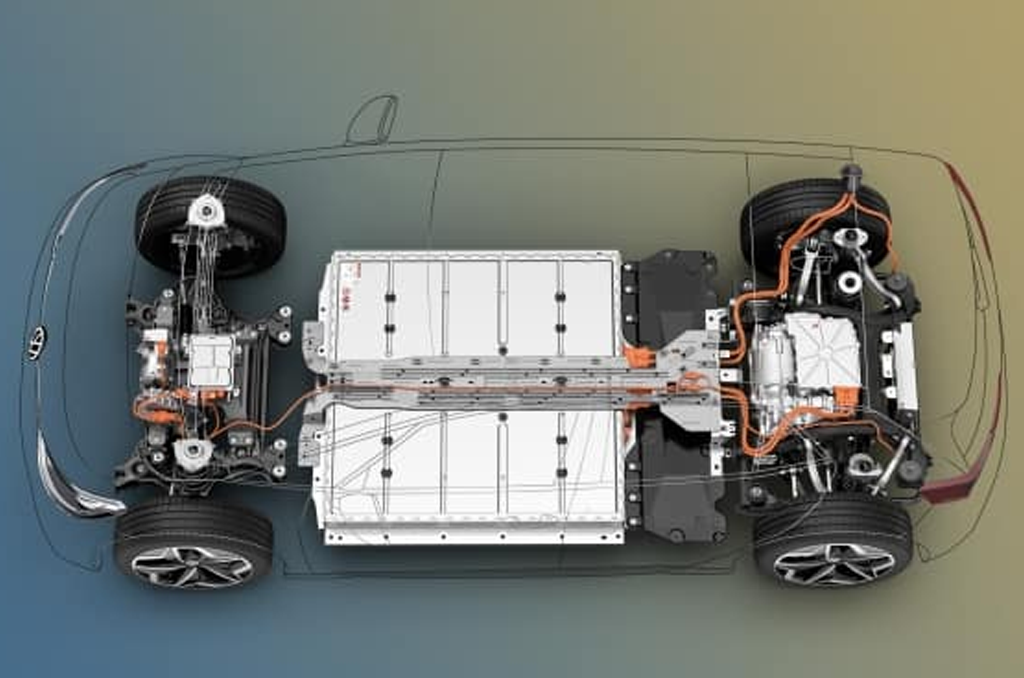Photo Source/Copyright: Volkswagen
Batteries have been around for hundreds of years—and humans carry them on their person in a variety of ways, whether they realize it or not. Lithium-ion batteries, in specific, power much of the technology we see and use today, such as in phones, watches, remotes, etc. With science, the use of lithium-ion batteries has expanded to modern-day transportation and, over the past decade, has created some of the most popular cars on the market. The upcoming Volkswagen ID.4 is looking to push the envelope further, and VW is betting on lithium-ion batteries to power the future of transportation.
Volkswagen hopes to expand its car lineup to include more battery-powered vehicles within the next few years to meet global emission standards. Research has shown that battery-powered vehicles have the ability to significantly reduce carbon emissions, enough to slow down and combat climate change, when compared to their gasoline-run counterpart.
Electric vehicles are not a thing of now; actually, they were experimented with at the beginning of the auto industry. Battery-powered vehicles were a popular best-seller when automobiles first started, largely due to their low maintenance requirements and quiet operation. Unfortunately, batteries back then did not allow riders to go for long distances, and after main roads became more popular, gas vehicles became the more affordable and feasible option in the early days.
Alessandro Volta created what is widely recognized as the first true battery in 1800, known as the voltaic pile. The battery consisted of copper and zinc paired discs piled on one another and were separated by a layer of soaked cloth or cardboard in brine or the (electrolyte). The battery Volta created was unlike anything before it because it was able to sustain power for longer periods of time and could conserve energy when turned “off.”
The current modern revival of electric vehicles can be attributed to lithium-ion batteries, which first gained prominence in the 1970s. Volkswagen actually built a handful of Microbus vans, kind of like the Mystery Machine out of Scooby-Doo, in the early 70s that used lead-acid batteries, which could take motorists roughly 25 miles in a trip. Today, those batteries have been ditched, and thanks to technology never sleeping, the lithium-ion battery holds four times as much energy and weighs a third of the weight, allowing for faster and longer-distance travel.
According to the Environmental Protection Agency (EPA), electric vehicles usually convert three-quarters of their energy to motion, and when charged with renewable energy sources, they have zero direct emissions while in use. When you compare that to its liquid counterpart in gas or alternative fuels like hydrogen and ethanol, an estimated two-thirds of the energy is released as carbon dioxide into the atmosphere.
As carmakers tackle the battery field, the Volkswagen Group is challenging the space with innovative startups such as QuantumScape. The focus of such a startup is to develop and further the progress of solid-state lithium batteries rather than gel or liquid-based electrolyte batteries. The solid component would allow VW to hold more energy per pound, adding significant range and efficiency to the vehicle being powered. Since 2012, Volkswagen has invested north of $300 million in QuantumScape to research and develop the technology they believe will power the future of transportation sooner than later.
Follow Sunrise Volkswagen on social media to stay up to date with the latest Volkswagen news, including the impending debut of the all-new ID.4.
Like what you see? Click here for more stories about Florida automotive news. Florida Insider is dedicated to educating, entertaining, and informing its readers about everything in Florida. Easy to read content at the palm of your hands and covering the stories that matter.

Terry is an avid Nascar fan who grew up attending races at Charlotte Motor Speedway in Concord, North Carolina, just down the road from his hometown of China Grove, NC. Terry currently resides in Wellington and has been writing for 15 years. He also enjoys watching the Road Runner Looney Tunes cartoon with his two sons in his spare time.

